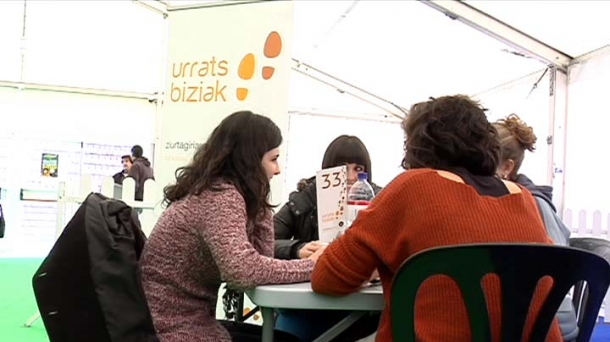entertainment
Eusko Ikaskuntza
December 3rd: 'International Day of the Basque Language'
Staff
eitb.com
ENE, the acronym of Euskararen Nazioarteko Eguna is an initiative that started within Eusko Ikaskuntza/Basque Studies Society in 1949 that promotes the universality of the Basque language.
-

Mintzodromoa. Photo: EITB
In 1948 Eusko Ikaskuntza-Basque Studies Society established the Basque Language Day which since has been celebrated yearly throughout the world on December 3rd.
The Basque Language Day is especially directed to Basque Diaspora communities, which even if they are thousands of kilometers far from the Basque Country, fight for keeping Basque culture alive.
The Basque Language Day is celebrated today, December 3rd, with many Basque centers joining the initiative. These centers have organized diverse cultural and social activities, and also recognition ceremonies for Basque students whose effort is dynamizing the Basque community across the world.
The Basque capitals will hold a comprehensive program of activities during this day. Thus, a mosaic with the name 'Euskara iruditan' will be created in Donostia-San Sebastian, with different and various photographs related to Euskera, from some old photos published in Euskara to the most recent, signs in Euskera ... Also, the famous event called Mintzodromoa will be organized with a large tent at the Boulevard.
In Vitoria-Gasteiz, a tribute concert Xabier Lete was organized on december 2nd and a macro-concert in Mendizorrotza on Saturday. In GazteHitz! groups like Lain, Kerobia, EH-Sukarra, Txapelpunk and Gatibu will perform, among others.
In Bilbao, as in recent years, Banden Lehia event will be organized with a competition of several musical groups singing in Euskera.
Celebrations in Boise
On Saturday, December 3 at 6:00 pm, Boise Basques and non-Basques alike will gather at the Basque Block in downtown Boise to celebrate International Basque Language Day.
There will be drinks, a potluck, and a Basque Karaoke competition, traditional Basque songs and poteo (bar hoping) in truly Basque Country style.
Euskera: The Basque Language
Basque, or Euskara / Euskera, is a language of unknown origin, with no known relationship to Indo-European, Uralic or European families of languages. It has been influenced by other languages like Celtic, Latin, Romance, Gascon and Castilian.
The history of the Basque language, until well into the 20th century, is the history of a language which is gradually losing part of its territory from the south to the north as a result of a number of different historic factors (mainly political and economic). Today it is spoken in the provinces of Gipuzkoa, Bizkaia, Alava and Navarre, as well as in the Basque provinces south-west France of Labourd, Basse-Navarre and Soule.
The first written literary work dates from 1545, although the first written words in Basque appear for the first time in the 10th century Emilianense annotations, written in Castilian Romance. This is mainly due to the fact that literature and popular tradition have been orally transmitted.
The recovery of Basque initially started in the 20th century with the creation of the first Basque school, or ikastola (1914), the foundation of the Basque Academy, Euskaltzaindia (1918), and the subsequent ikastola movement. It was in this same century that the bases of unified Basque were established (1968).
The revival of the 60s was consolidated in the 80s and 90s, when Basque was added to Castilian as one of the two official languages of the Basque Autonomous Community, and the Basque public institutions began adopting policies aimed at standardizing and promoting the language.
This means that, over the last twenty years, Basque has experienced the gradual increase in the number of new speakers, and an extension in the social and cultural areas in which it is used: education, university, administration, the media, etc., thus giving shape to an increasingly growing offer.
top stories



-
news
New anti-eviction law
Andalucia begins proceedings to seize confiscated houses from banks
-
news
London attack
British police ponder conspiracy after soldier murder
-
Sport
Giro d'Italia
Nibali tightens grip on overall lead after stage victory
© EITB - 2024 - Privacy Policy - Legal disclaimer - Cookie Policy - Cookie settings


